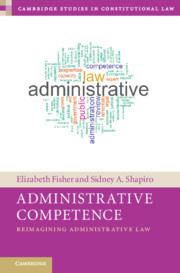Book contents
- Administrative Competence
- Cambridge Studies in Constitutional Law
- Administrative Competence
- Copyright page
- Dedication
- Contents
- Abbreviations
- Acknowledgments
- 1 The State We Are In
- Part I Making Administrative Competence Visible
- Part II Confronting the Origin Myths of Administrative Law
- Part III The Law of Public Administration
- Bibliography
- Index
Part II - Confronting the Origin Myths of Administrative Law
Published online by Cambridge University Press: 02 October 2020
- Administrative Competence
- Cambridge Studies in Constitutional Law
- Administrative Competence
- Copyright page
- Dedication
- Contents
- Abbreviations
- Acknowledgments
- 1 The State We Are In
- Part I Making Administrative Competence Visible
- Part II Confronting the Origin Myths of Administrative Law
- Part III The Law of Public Administration
- Bibliography
- Index
Summary
In the first half of the 2010s, the sociologist Arlie Russell Hochschild spent five years conducting field research in Southwest Louisiana on what she saw as the Great Paradox.1 As she explained, “I had imagined before I came [to Louisiana] that the more polluted the place in which people live, the more alarmed they would be by that pollution and the more in favor of cleaning it up. Instead I found Louisiana to be highly polluted and the people I talked with to be generally opposed to any more environmental regulation and indeed, regulation in general.”2 That opposition has led to support for political movements aimed at “deconstructing the administrative state.”3 Many of the people Hochschild interviews are Tea Party voters. Their views are not a world away from those who deny the legitimacy of the administrative state that we touched on in Chapter 1.
- Type
- Chapter
- Information
- Administrative CompetenceReimagining Administrative Law, pp. 101 - 214Publisher: Cambridge University PressPrint publication year: 2020

